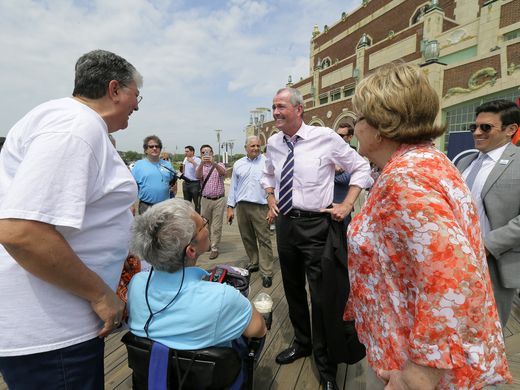North Jersey Casino Would Bankrupt Upstate New York Resorts, Analyst Opines
Posted on: December 16, 2017, 05:00h.
Last updated on: December 16, 2017, 02:34h.
The North Jersey casino ballot referendum to end Atlantic City’s gambling monopoly in the state was strongly defeated by voters during the November 2016 election.

That was great news for commercial casinos then under construction in Upstate New York, but next fall the question can be represented to Garden State voters.
Though outgoing New Jersey Governor Chris Christie (R) also supported bringing gambling north, Governor-elect Phil Murphy (D) does too, and he might be better suited to convince residents to come to his side. Should that happen, New Jersey-based gaming analyst and consultant Alan Woinski says it would be lights out for New York’s upstate casinos.
Talking with City & State New York regarding the Empire State’s three recently opened commercial casinos’ financial difficulties, Woinski opined that there would be no reason for the tens of millions of people in the New York City and North Jersey area to travel at least 60 miles just to place a bet.
“If this new governor here in New Jersey is able to convince lawmakers to put a casino in the Meadowlands, it’s all over for New York,” Woinski stated.
However, it will take more than Murphy convincing state lawmakers to bring gambling north, but also voters. The New Jersey Constitution bars commercial casino gambling outside Atlantic City, and mandates that “no gambling of any kind shall be authorized by the Legislature unless … authorized by a majority of the votes cast by the people.”
Saturation Point
States have expanded their gambling laws across the country over the last decade in response to the US recession and governments looking for new sources of tax revenue. That’s especially true in the Mid-Atlantic and Northeast, where today commercial casinos can be found not only in Atlantic City, but in West Virginia, Maryland, Delaware, Pennsylvania, New York, and Massachusetts.
Determining when enough is enough is a difficult proposition. Some say the industry has already long passed the tipping point, but those that know the industry best, Wynn Resorts and MGM Resorts, for example, continue to invest billions of dollars.
MGM says its development cycle, which included the $1.4 billion MGM National Harbor, will come to a close with its $960 million resort in Springfield, Massachusetts. Wynn remains under construction on its $2.4 billion Boston property.
New York Hurting
Four years ago, the New York Legislature authorized three upstate commercial casinos in an effort to revitalize struggling communities. All three sites promised to generate big revenues, and subsequent strong tax money.
But during their first year in operation, the trio of venues are heavily underperforming.
Tioga Downs, for instance, predicted $262 million in gross gaming over its first 12 months. With 10 months in the books, the casino has won just $125 million.
Woinski said lofty casino projections are reached by consultants who are often hired by state gaming commissions, and those agencies frequently tell the state and bidding company “what they want to hear.”
Woinski concluded the reason casinos go along with the unreasonable predictions, “What incentive does the casino have to come in with a really realistic number? Because somebody else is going to be coming in with an unrealistic one.”
Last Comment ( 1 )
I agree that the market in the Northeast area is already oversupplied with casino operations. I live outside Philadelphia and have the choice of over about 10 casino or racino operates within a day's drive. The state of Pennsylvania just authorized even more mini casinos which will add to more competition for the available gambling dollars. Add in the addition of home betting via computer or phone devices and the days of increased revenue to the states are over or at least greatly reduced in increasing year to year. At some point we will see what happened in Atlantic City repeated where casinos close and both tax revenue and jobs are reduced.